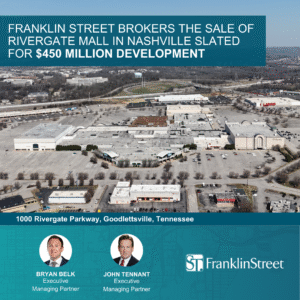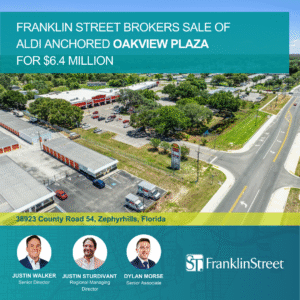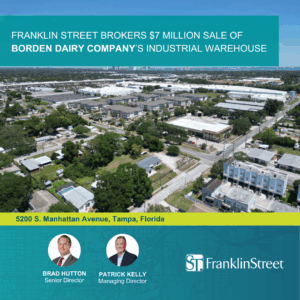Excerpted from BOMA Georgia’s Insight Magazine story.
Dave Curry, Senior Regional Manager of Franklin Street of Atlanta, shares with BOMA Georgia his thoughts on how technology has affected the role and possibilities of today’s modern property manager, as well as how future trends may impact the commercial real estate industry.
1. How has technology changed how you approach property management?
Years ago, I saw a property management firm’s office reception area display, an electronic screen with a pie chart, which showed the breakdown of the building’s operating costs. It was color-coded and differentiated controllable costs from non-controllable costs, and it also clearly identified year-over-year cost reductions by categories. The monitor was cutting edge for its time, and it gave tenants and prospects something to analyze as they awaited their meeting with the property or leasing manager. More importantly, I thought, “What a terrific brand differentiator.”
In an industry which is hard pressed to identify “The Ritz Carlton” of property management firms, they were doing something that nobody else was. Some twenty-plus years later, property management firms still struggle to identify unique characteristics of their firms, but I see an opportunity on the horizon.
2. Name one leading tech trend that could have a big impact on building managers.
First, think back to when you used to balance your checkbook. In the property management world, most firms still use a similar process. Each month, they email their clients a monthly report that reflects a static look of the revenues, expenses and leasing progress associated with the applicable asset.
The advent, however, of a technology called “block chain” (most closely associated with Bitcoin) has some distinct opportunities in property management. Envision a shared monthly report that is designed to update daily (or even hourly) by multiple users in multiple places, and you have a rudimentary understanding of how blockchain technology can offer a client real-time data on their investment. When the power bill gets paid, the transaction is immediately rolled through the financials. A lease commission is paid out, and the effects are seen in real time. Friday payday is here, and so are the updated financials. The idea of scanning multiple PDFs with dated data to achieve a monthly report reminds me of the checkbook balancing exercise — it can still be done, but why continue that way?
3. How does the Internet of Things affect the property management industry?
Sensor technology is probably the most significant advancement I’ve seen. Being able to adjust lights or HVAC for occupancy management or to access interior/exterior conditions, results in automated comfort control and decreased utility costs.
IoT also has applications that bring automation and efficiency throughout an entire asset through data capture and smart technology integration. Parking lots and garages can be equipped with sensors which in turn can direct visitors to available spaces. Inside the building, some owners now require any sinks or water heaters to be equipped with sensors not to measure the usage (although that too could be applied), but rather to monitor for the presence of water so leaks can be identified before they become significant; this can be especially valuable if the leak should occur in a vacant suite that would otherwise go unnoticed for some time. IOT has safety applications as well now that most property managers (and owners) can monitor building conditions in real time on their smart phone.
4. Do you see drone technology or virtual reality enhancing property management?
Drone technology can be used for building inspections but also for creating a better user experience from a leasing or sale perspective. Virtual reality can provide prospects virtual tours allowing the ability to see how a space would flow while fully occupied. Certainly, the residential market has employed drone technology for some time, but commercial land brokers and timber sales find drone technology to be an ever-increasing requirement to effectively market their products.
5. How will the rise of autonomous vehicles affect property management?
In 2012, I was part of a property team that brought one of the first Electric Vehicle (“EV”) charging stations to an Atlanta high-rise office building. Due to the concept’s newness, we were unsure of its acceptance by the tenant base. So, to attract interest, our team placed the stations in ideal parking spaces in the front of the garage near the building entry. We installed equipment for four parking spaces in a garage that held a couple thousand cars. The response was overwhelmingly positive.
Today, with the need to promote these parking spaces long since gone, the EV stations have been relocated to less high-profile areas (in the bottom of the garage), there are more than a dozen spaces, and there are daily waiting lists to use the EV equipment. The same process will unfold with autonomous vehicles and the need for thousands of designated parking spaces will slowly dissipate. I envision property owners structuring leases that charge less if you are not requiring some standardized parking ratio five days per week.
6. Has e-commerce hurt the retail property management industry?
Everyone has a list of retail closings or bankruptcies, but what is often overlooked are the chains who are growing. Marshall’s, Dollar General, Ross, Dollar Tree, T.J. Max, and HomeGoods are all expanding. Visit your alma mater and you are likely to see Barnes and Noble, Target, and UPS, instead of the university-run stores that existed during your day. Virtually every new apartment complex under construction in urban markets have retail components that did not exist in the last development cycle. Retail property management is not going away, but it is adapting. And for large retail outlets like malls and big boxes, the need for experienced, “outside-the-box” property managers is greater than ever as these assets are repositioned for today’s market.
ABOUT THE SUBJECT
With over 25 years of experience, Dave Curry is a Senior Regional Manager for Franklin Street’s Commercial Property Management division in Atlanta. Having initially joined Franklin Street to oversee the Atlanta retail management portfolio, he currently provides leasing services for the firm’s largest retail management client (America’s Realty), and provides business development and recruiting opportunities throughout the Atlanta markets. He can be reached at [email protected].



